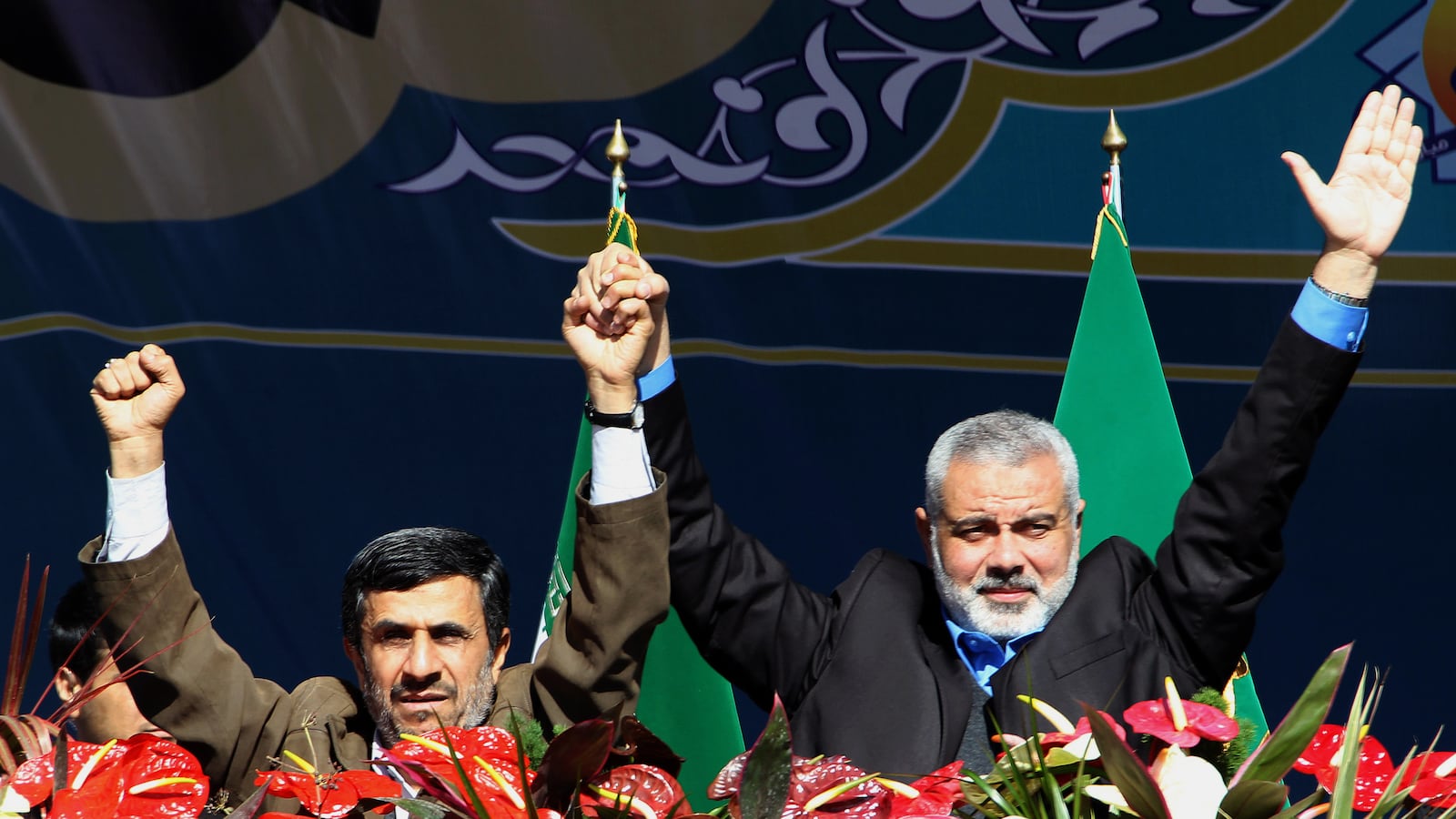Back in October 2001, just after 9/11, then Israeli Prime Minister Ariel Sharon warned the West not to "appease" the Arabs at Israel's expense. "Do not repeat the terrible mistakes of 1938, when the enlightened democracies" sacrificed their ally Czechoslovakia in the hope of buying off Hitler. Israel "will not be Czechoslovakia", Sharon asserted. George W. reportedly was very angry.
Jews are ever mindful of history. Indeed a recent opinion poll had 95% of Israeli Jews highlighting the Holocaust as a major influence on their lives (despite the fact that almost half of Israel's Jews, of largely Sephardi origin, were unaffected by Nazism). Benyamin Netanyahu, Israel's current prime minister, is no exception. Indeed, in his speech before AIPAC last week he theatrically invoked the Holocaust, brandishing two documents—the World Jewish Congress's 1944 appeal to Roosevelt to bomb the railway lines to Auschwitz to halt or disrupt the Nazi murder of the Jews, and the American refusal in response. Before the Holocaust, America, along with most of the western democracies, had closed its gates to mass Jewish immigration – which might have saved many who subsequently perished in the death camps.

I completely agree with Netanyahu's comparison and fear—that Iran, under its present leadership, represents an existential threat to Israel. If they obtain nuclear weapons, Ahmadinejad and Khamenei may well use them against Israel – and, given the Jewish state's size and population concentration in the coastal plain between Tel Aviv and Haifa, an atomic strike would cripple if not destroy it. Indeed, the mere possession of a nuclear arsenal by Iranian regime would probably severely harm Israel, rendering it unattractive to foreign investors and would-be Jewish immigrants, and would in all likelihood propel many of its citizens, in view of the prospect of nuclear destruction, to seek their fortunes elsewhere.
Netanyahu didn't spell all this out, but his message was simple, perhaps even crude: Iran is Nazi Germany, the Jews are once more threatened with destruction (Israel's Jewish population numbers six million—the number who died at the hands of the Nazis), and Obama is behaving like Roosevelt. Indeed, President Obama, who in one of his first acts in office made a placatory speech in Cairo to the Muslim world (while pointedly declining to visit Israel), is not only refusing to bomb the "railway lines" at this time but is vigorously restraining Israel from launching its own preventive strike against the Iranian nuclear installations while denying Israel some of the tools needed to make such a strike effective, i.e., the latest bunker-busting bombs and air refueling tankers.
During Netanyahu's Washington visit Obama told the Israeli prime minister – and the world—that there was still time for diplomacy and sanctions to persuade the Iranian leadership to halt its nuclear project. Much of the argument between Israel and America is over just how much time. According to the former head of the Mossad Meir Dagan, Israel's intelligence chiefs agree on this point with Obama, and the bulk of the Israeli public, according to a recent opinion poll, appears to oppose an Israeli preventive strike at this time. But Netanyahu and his defense minister, Ehud Barak, and other cabinet ministers believe that time is fast running out: They argue that the Iranians are moving much of their uranium enrichment capability to a site deep underground, which will make it impervious to conventional attack; and in any case no one really knows just how close the Iranians are to the bomb as some of their nuclear activities and sites most likely have gone undetected.
On one thing most Israelis in responsible positions agree - that an Iran armed with nuclear weapons and led by its current rulers—who are messianic and irrational by Western lights—cannot be depended upon not to use the Bomb once they have it. They may have launched their nuclear program, under the Ayatollah Khomeini, back in the 1980s, with an eye to deterring or overcoming their belligerent neighbor, Iraq, but since then, the only clear target for such weapons is Israel. Iranian leaders have repeatedly called for its destruction—they call Israel "the Zionist regime"—and deny the Holocaust to boot. Israel's leaders fear that deterrence may not work against people who are irrational and who believe that Allah will protect them or who believe that the destruction of the Jewish state is a divine imperative and is worth any price.
Netanyahu's critics, and some American commentators, argue that, in terms of potential power, "Iran is not Nazi Germany" and is not threatening world domination. This may be true—though both Khomeini and Ahmadinejad indicated that they see a future world dominated by Islam. But for Israelis, the threat to destroy Israel is bad enough. And, besides, Iran clearly manifests a threat to major American (and international) interests as well, which Obama recently acknowledged. Nuclear weapons are today what the Colt 45 was in the Wild West—an equalizer. Islamist Iran may not be the industrial and scientific powerhouse that was the Third Reich—but atomic weaponry would turn it instantly into a much-feared, major player, overawing the Middle East and threatening the West's oil supplies or holding the West to ransom. A nuclear Iran would also most likely trigger a regional arms race (Saudi Arabia, Turkey, Egypt come instantly to mind)—which, on its own, would mortally threaten regional and international stability.
It is worth recalling that even without nuclear weapons, Iran—brandishing a whole range of threats—has successfully deterred both Israel and the West from responding to some of its more outrageous activities (in 1992 its agents blew up Israel's embassy in Buenos Aires; in 2007 it took hostage more than a dozen British marines in the Persian Gulf; and over the past decade it has armed and trained anti-American guerrillas in Iraq and Afghanistan, and probably even orchestrated some of their operations - and all three countries failed to respond robustly). This would seem to parallel Hitler's successes against the West even before Germany was fully armed (the re-introduction of conscription and the Luftwaffe, both prohibited by the Versailles settlement, in 1935; the re-militarization of the Rhineland in 1936, etc.)Iran, like Hitler in the 1930s, is constantly testing the limits of the democracies' patience, and the West, as in the 1930s, is extremely reluctant to go to war. Much like Hitler then, Iran today perceives the West as soft. And the haunting specter of the wars in Iraq and Afghanistan is today filling the role that World War I fulfilled in stoking the fear of war in the democracies during the 1930s.When referring to the Holocaust, Israeli leaders are wont to point to what they see as the main difference between today and the 1940s—that the Jewish people now have a powerful sovereign state of their own, and that they are not defenseless. But in fact, short of using its non-conventional weaponry, Israel on its own cannot definitively destroy the Iranian nuclear project. For that, American power is required. That is why Israel's past and present leaders, while constantly beating the drums and deploying covert means to sabotage and delay the Iranian project, have so far shied away from unleashing the Israeli Air Force and navy in a main assault. The truth is that Israel remains vulnerable (and the Islamist takeover of much of the Arab world in recent months in the so-called "Arab Spring" has only increased the sense of vulnerability) and needs America.Obama has repeatedly said that the US will not allow Iran to get the bomb but Israelis regard this as less than a definitive commitment. Israelis hope that the more capable America will take out the Iranian nuclear installations. Or, at the least, will give Israel the tools to do the job and support it politically when it embarks on this assault, and—if the Iranians renew their push for nuclear weapons—complete what Israel started.




